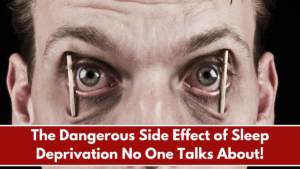We often hear that getting enough sleep is essential for good health, but have you ever wondered exactly how much sleep your brain really needs? Many people believe that they can function perfectly fine on just 4 to 6 hours of sleep, while others insist that 8 hours is the golden standard. But what does science actually say?
Recent research suggests that the amount of sleep needed for optimal brain function is more complex than just a single number. Factors such as age, lifestyle, genetics, and overall health all play a role in determining how much rest the brain requires. Studies have shown that inadequate sleep can lead to memory problems, reduced cognitive function, mental health issues, and even long-term damage to the brain.
So, how much sleep do you really need? And what happens to your brain when you don’t get enough? Let’s dive into the science behind sleep and why it’s so critical for maintaining a healthy and sharp mind.
The Science Behind Sleep and Brain Health
Why Sleep is Essential for the Brain
Sleep isn’t just about rest—it’s a vital process that helps your brain detox, repair, and recharge. While you sleep, your brain goes through different cycles, including:
- Non-Rapid Eye Movement (NREM) Sleep – Helps with deep rest and body repair.
- Rapid Eye Movement (REM) Sleep – Essential for memory consolidation, learning, and emotional processing.
During sleep, the brain clears out toxins, strengthens neural connections, and processes information from the day. Lack of sleep prevents these processes from occurring, leading to problems like forgetfulness, poor concentration, and increased stress levels.
How Much Sleep Does the Brain Need?
The ideal amount of sleep depends on various factors, but here’s what experts recommend:
- Infants (0-1 year): 14-17 hours per day
- Children (1-12 years): 10-14 hours per day
- Teenagers (13-18 years): 8-10 hours per night
- Adults (18-64 years): 7-9 hours per night
- Seniors (65+ years): 7-8 hours per night
However, some people may require more or less sleep depending on their genetic makeup, daily activities, and overall health.
The Consequences of Sleep Deprivation on the Brain
Memory Loss and Cognitive Decline
One of the most noticeable effects of sleep deprivation is memory impairment. Studies show that sleep is essential for transferring information from short-term to long-term memory. Without enough rest, the brain struggles to retain and recall information, making it harder to learn new skills or remember important details. Chronic sleep deprivation has even been linked to an increased risk of Alzheimer’s disease and dementia.
Increased Risk of Anxiety and Depression
Lack of sleep disrupts neurotransmitter activity, leading to increased stress, irritability, and emotional instability. Research has found that individuals who consistently sleep less than 6 hours per night are at a higher risk of anxiety and depression. Sleep deprivation can also make it harder for the brain to process emotions effectively, leading to mood swings and increased sensitivity to stress.
Poor Decision-Making and Impulse Control
Have you ever noticed that when you’re tired, you’re more likely to make poor decisions or give in to cravings? That’s because sleep deprivation impairs the prefrontal cortex, the part of the brain responsible for reasoning, judgment, and impulse control. This can lead to reckless behavior, unhealthy eating habits, and difficulty focusing on important tasks.
Increased Risk of Neurological Disorders
Studies suggest that chronic sleep deprivation increases the risk of serious neurological conditions, including stroke, Parkinson’s disease, and multiple sclerosis (MS). This is because poor sleep increases inflammation in the brain, damages nerve cells, and weakens the immune system, making it harder for the brain to repair itself.
Reduced Problem-Solving and Creativity
When you sleep, your brain processes information and makes connections between new and old knowledge. This process is crucial for problem-solving, critical thinking, and creativity. Sleep deprivation prevents the brain from making these connections efficiently, leading to reduced productivity and difficulty generating new ideas.
The Dangers of Too Much Sleep
While getting too little sleep is dangerous, sleeping too much can also have negative effects on the brain. Studies have found that regularly sleeping more than 9-10 hours per night can lead to:
- Cognitive decline – Similar to sleep deprivation, excessive sleep can slow brain function.
- Increased risk of stroke – Long sleep durations have been linked to a higher risk of blood clots and stroke.
- Higher rates of depression – Sleeping too much has been associated with low energy levels, increased stress, and mood disorders.
The key is finding the right balance—not too little and not too much.
How to Improve Sleep for a Healthier Brain
Maintain a Consistent Sleep Schedule
Go to bed and wake up at the same time every day, even on weekends. This helps regulate your body’s internal clock.
Limit Screen Time Before Bed
Blue light from phones, tablets, and computers suppresses melatonin production, making it harder to fall asleep. Avoid screens at least an hour before bedtime.
Create a Relaxing Bedtime Routine
Engage in calming activities like reading, meditating, or taking a warm bath before bed. This signals to your brain that it’s time to unwind.
Avoid Caffeine and Heavy Meals Before Sleep
Caffeine and late-night snacks can interfere with sleep quality, making it harder to enter deep sleep stages. Try to avoid caffeine after 2 PM and eat dinner at least 2-3 hours before bed.
Optimize Your Sleep Environment
Make sure your bedroom is cool, dark, and quiet. Investing in a comfortable mattress and blackout curtains can significantly improve sleep quality.
Exercise Regularly
Regular physical activity helps regulate sleep cycles, but avoid intense workouts right before bedtime, as they can increase alertness.
Try Sleep-Enhancing Supplements
Melatonin, magnesium, and chamomile tea can promote relaxation and better sleep, but consult a doctor before taking any supplements.
Conclusion
So, how much sleep do you really need for a healthy brain? For most adults, 7-9 hours per night is ideal, but individual needs may vary. Getting too little or too much sleep can have negative effects on memory, decision-making, and overall brain health.
Prioritizing quality sleep is one of the best things you can do for your brain. By following healthy sleep habits, you can improve focus, boost mood, and reduce the risk of cognitive decline. The next time you consider sacrificing sleep for work, social media, or entertainment, remember—your brain depends on rest to function at its best.
FAQ’s:
1. How does sleep impact brain function?
Sleep is essential for brain function because it helps with memory consolidation, problem-solving, and emotional regulation. During sleep, the brain goes through cycles of non-rapid eye movement (NREM) and rapid eye movement (REM) sleep. These cycles help the brain process new information, strengthen neural connections, and remove toxins. Without enough sleep, cognitive functions decline, making it harder to focus, learn, and make decisions.
2. What happens to the brain when you don’t get enough sleep?
When you don’t get enough sleep, your brain struggles to function properly. Sleep deprivation leads to memory loss, reduced concentration, and impaired problem-solving skills. It also increases the production of stress hormones, which can negatively impact mood and mental health. Over time, chronic sleep deprivation increases the risk of neurological diseases such as Alzheimer’s, dementia, and stroke.
3. How much sleep do different age groups need for a healthy brain?
Sleep requirements vary depending on age:
- Infants (0-1 year): 14-17 hours per day
- Children (1-12 years): 10-14 hours per night
- Teenagers (13-18 years): 8-10 hours per night
- Adults (18-64 years): 7-9 hours per night
- Seniors (65+ years): 7-8 hours per night
While these are general recommendations, individual sleep needs may differ based on lifestyle, genetics, and overall health.
4. Can sleeping too much harm the brain?
Yes, excessive sleep can be just as harmful as sleep deprivation. Sleeping more than 9-10 hours per night on a regular basis has been linked to:
- Cognitive decline and slower brain function
- Increased risk of stroke and cardiovascular disease
- Higher rates of depression and mood disorders
- Lower energy levels and reduced motivation
Excessive sleep may also indicate underlying health issues such as sleep apnea, thyroid disorders, or depression.
5. What are the long-term effects of sleep deprivation on brain health?
Long-term sleep deprivation has been associated with serious neurological conditions. Research shows that poor sleep contributes to:
- Alzheimer’s and dementia: Lack of sleep prevents the brain from clearing out toxic proteins, which can lead to neurodegenerative diseases.
- Increased risk of stroke: Sleep deprivation leads to high blood pressure and inflammation, which increases stroke risk.
- Weakened immune function: Sleep is crucial for maintaining a strong immune system. Chronic lack of sleep makes the brain more susceptible to infections and diseases.
6. Does sleep affect mental health?
Absolutely. Sleep and mental health are deeply connected. Poor sleep is linked to:
- Increased anxiety and depression
- Higher levels of stress and emotional instability
- Reduced ability to regulate emotions
- Greater risk of developing mood disorders
Lack of sleep also affects the production of neurotransmitters like serotonin and dopamine, which play a role in happiness, motivation, and overall mental well-being.
7. How does sleep affect memory and learning?
Sleep is essential for consolidating new information and forming long-term memories. During sleep, the brain strengthens neural connections that help store knowledge. Without enough sleep, the brain struggles to retain new information, leading to forgetfulness and difficulty learning. Students, professionals, and anyone trying to acquire new skills benefit from quality sleep.
Research has shown that individuals who get enough sleep perform significantly better on cognitive tasks, including problem-solving, reasoning, and decision-making.
8. What are some common sleep disorders that affect brain health?
Several sleep disorders can negatively impact brain function, including:
- Insomnia: Difficulty falling or staying asleep, leading to chronic sleep deprivation.
- Sleep Apnea: Interrupted breathing during sleep, reducing oxygen levels in the brain and causing daytime fatigue.
- Restless Leg Syndrome (RLS): Uncontrollable urge to move the legs, disrupting sleep cycles.
- Narcolepsy: Excessive daytime sleepiness and sudden sleep attacks, interfering with daily activities.
If left untreated, these disorders can lead to cognitive decline, memory loss, and increased risk of neurological diseases.
9. What can you do to improve sleep quality for better brain function?
Improving sleep quality doesn’t just mean sleeping longer; it also means sleeping better. Here are some proven tips for optimizing sleep:
- Stick to a consistent sleep schedule: Go to bed and wake up at the same time every day.
- Limit screen time before bed: Avoid blue light from phones and computers at least an hour before sleep.
- Create a relaxing bedtime routine: Engage in calming activities such as reading, meditation, or listening to soft music.
- Avoid caffeine and heavy meals at night: Caffeine can stay in the system for up to 6 hours, making it harder to fall asleep.
- Exercise regularly: Physical activity improves sleep quality, but avoid intense workouts right before bedtime.
- Keep your bedroom cool, dark, and quiet: A comfortable sleeping environment can significantly improve rest.
10. Is it possible to catch up on lost sleep?
While you can recover some lost sleep, it’s not a perfect solution. Sleeping in on weekends or taking naps can help with short-term fatigue, but chronic sleep deprivation causes lasting damage that cannot be fully reversed. Studies show that missing just a few hours of sleep can impact cognitive function for days.
If you’ve had a few nights of poor sleep, try gradually increasing your sleep duration over the next few days rather than oversleeping all at once. The best approach is to maintain a consistent sleep routine and prioritize rest every night.



